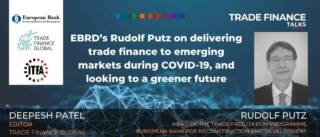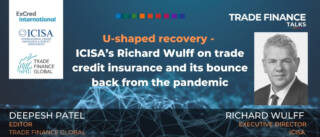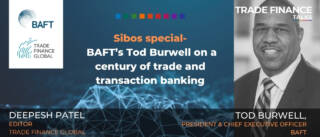EBRD’s Rudolf Putz discusses his experience delivering trade finance to emerging markets during the COVID-19 pandemic, and how EBRD is looking to a greener future.
Like many products within trade finance, trade credit insurance has endured serious volatility during the last 12-18 months, thanks to the COVID-19 pandemic.
As the trade finance industry shifts towards more digitalised ways of doing business, new niches are opening up within the market.
On the eve of COP26 – the biggest climate summit of the year – the world is more focused than ever on reducing carbon emissions, and on the role that individual companies can play in tackling climate change.
We have just completed the marathon that is virtual Sibos – a festival of trade, treasury, and payments. So what better way to celebrate than to be joined by the CEO of the Banks Association for Financing Trade (BAFT), Tod Burwell.
How has SWIFT changed, what challenges have they faced and how will they continue reinventing themselves in the highly competitive global payments market?
The current banking landscape is going through a makeover. PSD2 and open banking have it’s advantages, but there are also many opportunities to continue to level the playing field, share risks and revisit the rules.
World trade is central to economic growth and as we emerge from the pandemic, trade is paramount in enabling the global economy to recover. Is the time really now, for digitising trade, and how can advance the dialogue to reduce friction, costs and risk?
Global supply chains have been and continue to be deeply impacted by the changes that have taken place in the last 12 months. From the Suez canal debacle to the current shortage of HGV drivers in the UK, it is fair to say that the industry is, currently, facing significant challenges.
Open account business drives economic activity worldwide, and during times of volatility, uncertainty and of course, the pandemic, the need for solutions when it comes to receivables finance has never been more pronounced.
World trade of goods has declined some 12% in the last year, representing a loss of $22 trillion USD of trade. Is it all doom and gloom for trade, or will we see a resurgence?
COVID-19 has provided us with an opportunity for a reset, and so has the ICC’s leadership at the Banking Commission. TFG’s editor, Deepesh Patel, sat down with Lynn Ng, the ICC’s new Banking Commission chair, to discuss the ICC’s new governance strategy moving forward, and some of the key priorities for the Banking Commission.
In this episode of Trade Finance Talks, we discussed the realities of implementing the United Nations Model Law on Electronic Transferable Records into local markets – an incredibly important advancement in accepting electronic signatures.
Reporting Export Incidents, whether on a voluntary or involuntary basis, as well as investigating non-compliance in relation to trade finance operations, is of huge importance to multinationals, banks and policy makers. With that in mind, Spencer Chilvers, Head of Export Control Policy, Rolls-Royce to discuss export controls, the current sanctions environment, and the future, on Trade Finance Talks!
 Australia
Australia Hong Kong
Hong Kong Japan
Japan Singapore
Singapore United Arab Emirates
United Arab Emirates United States
United States France
France Germany
Germany Ireland
Ireland Netherlands
Netherlands United Kingdom
United Kingdom















